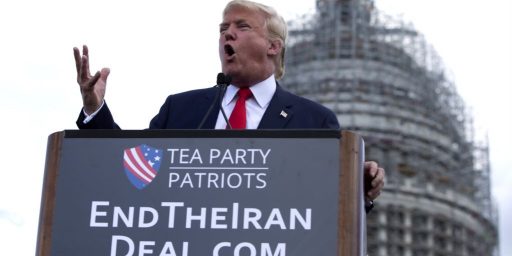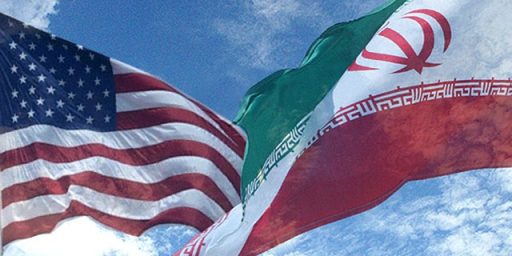The Lunacy of Iranian Sanctions
Daniel Larison makes an excellent point against those people who are now calling for increased sanctions against Iran:
This is madness. Have the current sanctions brought the regime anywhere close to its knees after decades? There is not a single example where economic sanctions actually compelled a non-democratic regime to change course on an internal political matter. We have no reason to believe that it will work. What we do know is that it will make average Iranians poorer. The nascent Iranian middle class that everyone is so pleased with will be impoverished, and their economic prospects will go from bad to worse. Causing a run on the rial would annihilate whatever savings average Iranians have and magnify their current inflation problem, which could have a political radicalizing effect and not one that we would find attractive. Tanking the Iranian economy would mean that unemployment shoots up even higher than the already miserable 20%+ that it is now.
[…]
Why would such an imposition of sanctions not allow the authorities to claim the mantle of nationalist resistance against international hostility? Milosevic held on for years longer than he would have been able to do otherwise because of the hostility towards Serbia that most of the world showed in the ’90s. Why would imposing extremely tight sanctions not put the protesters on the defensive and blunt their earlier criticism about Iranian economic grievances? As bad as the government’s mismanagement and corruption undoubtedly are, economic conditions can always get worse under tightened international sanctions, and the regime will be able to argue truthfully that conditions have worsened because of policies advanced by Washington.
Amen to that. I have never understood the perpetual popularity of economic sanctions as a means of “punishing” authoritarian regimes. It rarely has the desired effect.






It really depends on what your objectives are. If you want to weaken a country, then sanctions can be a good way to go. They’re not so good, obviously, at removing a regime.
They also happen to be much cheaper than invading and deposing leadership.
But much less satisfying to the Armchair Airborne.
Ya we you end all sanctions now!!!! the mullahs need money to pay the their city workers!!!!!!
A robust sanctions regime can be effective. The catch is in the “robust” part and a robust sanctions regime can’t be imposed on a country with powerful patrons.
Patrons do get fed up occasionally as we’re seeing with China and North Korea.
Stopping Iran’s supply of refined gasoline would probably end the present regime in short order. Would the Russians and Chinese agree to it? I think it’s doubtful.
However, as suggested above when other options are limited and of dubious effectiveness sometimes a poor and relatively ineffective strategy is all you’ve got.
Just out of curiosity, who are “those people” who are calling for economic sanctions? Larison links to an Iranian professor at GWU. Who else?
So, provide us with an alternative, Alex.
Mind, a workable one.
Perhaps another sternly worded letter or UN resolution will suddenly cause the mullahs to see the light. Sanctions are one of the soft power levers so popular in some circles these days. If you are going to renounce that as well, what’s left besides the comfy chair?
Eric,
Easy. Free trade. Allow and encourage more access to American goods and products.
Sanctions have yet to bring down a single authoritarian government, period.
Alex, can you provide an example in which free trade, solely from our side, has brought down an authoritarian regime?
Dave,
I’m not sure what you mean.
Free and open trade has moved many nations in less authoritarian directions over the past 50 years.
Well, maybe not so much.
You are perhaps unaware that Iranian trade under president Bush, going from only $8.1 million worth of products were sold to Iran under Clinton to $146 million worth of American products were sold in Iran last year. All this in spite of the sanctions.
Mind, now, that doesn’t count the secondary trade running through places like Dubai, for example, which would likely quadruple those figures.
Has this increased trade made what passes for the Iranian government any more pliable?
Problem is that the dollar is one of the key elements in trying to keep nukes out of the hands of the Mullahs. To that end, we have two tools.
On the one hand is the sanctions… rather weak in total because they run through the UN and are driven by what our supposed Friends, Russian China, and France would accept.
On the other is pressure on businesses around the world, particularly multi-nationals, to avoid doing business with Iran. The object of that of course is to force the Mullahs into the admission that the price of nukes against the will of the rest of the world is just too high. And, their bravado aside, it’s been working to slow their development down. In fact I’d suggest absent those sanctions, they’d have had nukes by now, which I still consider to be an unacceptable situation.
Given the current situation, the first thing that happens, on lifting sanctions against Iran is that oil investments go sky high, as do the monetary take from those oil fields, which went ill kept following the 79 revolution. That kind of money flowing into Iranian government coffers would certainly be a much needed bosst to their nuke program. Their currently stated priorities suggest that would be the first place that huge pile of money would go.
So, we’ll all have cheaper gasoline to drive away from the stike sites with, I suppose. Unacceptable.